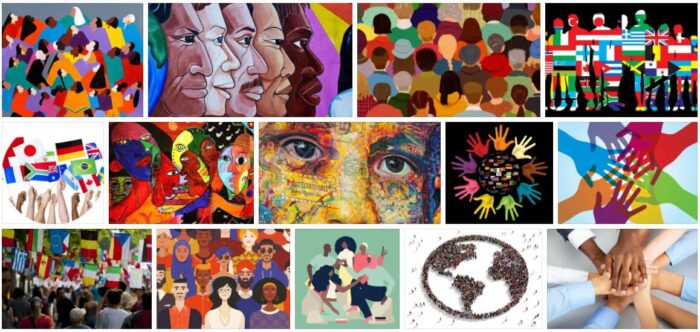
Multiculturalism
In this article, we seek to establish the origin of multiculturalism, define its meaning and identify the main criticisms of such a movement.
The large-scale migratory movement intensified after the Second World War , with the technological boom represented by the third Industrial Revolution. The pulverization of space was a major driver of the migration process, leading different groups to share the same space.
Such coexistence resulted, according to multiculturalism scholars , in a more orderly and peaceful relationship, since it was necessary to share a common space, taking into account the difference and the culture of the other to guarantee harmony.
Stuart Hall, one of the theoretical pioneers of multiculturalism, points out one of his limitations when addressing the issue of the resulting commercial and cultural influences:
[…] Cultural flows, between nations, and global consumerism create possibilities for “shared identities” […] between people who are quite distant from each other in space and time. As national cultures become more exposed to outside influences, it is difficult to keep cultural identities intact or to prevent them from being weakened through bombardment and cultural infiltration.
HALL, Stuart. Cultural identity in postmodernity . Rio de Janeiro: DP&A, 2006. p. 74.
Multiculturalism preaches that living in the same space leads different cultures to accept each other better, promoting harmony. Cultural integration
Criticisms of multiculturalism
The multiculturalism movement, which intensified from 1970, began to encounter its first obstacles from 2010 onwards, due to the expressive increase of migrants from other origins and creeds towards the USA and western Europe, added to the economic crisis that rocked those regions.
Such a reaction defends the decline of multicultural practices, since the coexistence with other cultures, according to its theorists, had been defining the weakening of the national culture itself. This fact, for critics of multiculturalism, should be avoided by preventing the entry of new migrants and forcing those already resident to adapt to the laws and customs of the country in which they started to live.
The strengthening of nationalism ends up showing xenophobic practices, which threatens the harmonious and democratic coexistence that multiculturalism wishes to defend.
Cultural Relativism
Definition
An anthropological view opposed to ethnocentrism is cultural relativism.
Anthropological theories that adopt cultural relativism as a worldview tend to believe that each society and human group develops according to their own needs and interactions.
According to this theory, a different culture cannot be judged to be “inferior” just because it is not similar to that of the evaluator.
While ethnocentrism has the perspective that a group is different and superior to others due to certain characteristics, such as color, ethnicity, religion, technology, among other distinguishing factors, cultural relativism points to a different perspective; after all, if a society manages to develop and obtain comfort and survival only with hunting and gathering, this organization cannot be considered inferior to the western industrial society, for example.
In the first, food, although scarce, is shared and in the second, despite the abundance of production, poor and dispossessed people accumulate in search of food.
Cultural relativism, therefore, denies any kind of distinction or superiority of one society over the other, opting for another posture: the tolerance , necessary for different peoples, with different forms of organization, to respect each other and their differences, which further enrich human culture.
Limits and criticisms of cultural relativism
Although cultural relativism seeks to combat ethnocentric readings, it also has certain limitations.
Cultural relativism prioritizes and overemphasizes the cultural customs of each people, stating that it cannot interfere in its development in a way that profoundly changes its structure of social development.
Thus, in cases such as the circumcision of African girls in non-existent hygiene conditions, the limits of relativism regarding the “basic rights of a citizen” are questioned.
